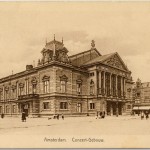If tradition means not preserving the ashes but fanning the flames, in the words of Gustav Mahler, the Royal Concertgebouw Orchestra is celebrating its 125th anniversary with one foot firmly planted in the past and the other striding fearlessly into the future. Between a tour of six continents this season, the orchestra gave an anniversary concert on April 10 at its home concert hall, the Concertgebouw, founded the same year as the orchestra, in 1888, with an official opening on April 11. For modern-day residents of the Netherlands, this month also marks an important time in politics. Queen Beatrix will soon cede the throne to Prince Willem-Alexander, making him the country’s first King since 1890. The event honored the royal family, in attendance with Princess Máxima—soon-to-be Queen and the orchestra’s official patron—with red carpeting and black-tie dress. But the RCO, a crowned exception on the Netherlands’ tenuous landscape of budget slashes to the arts, does not take its status for granted. The entire proceeds of the concert, which featured three soloists—Thomas Hampson, Janine Jansen and Lang Lang—in a program of late 19th and turn-of-the-century repertoire alongside a new work by Dutch composer Bob Zimmerman, will be invested in educational outreach.
The RCO, which enjoyed close relationships with Mahler and Strauss under the 50-year tenure of Dutch conductor Willem Mengelberg, has not only kept this music flowing in its veins but performs in a hall which provides an ideal acoustic environment for the luxurious strings, golden brass and sumptuous dynamic architecture that emerges under Music Director Mariss Jansons (winner of this year’s Ernst von Siemens Prize, otherwise known as the classical world’s ‘Nobel’). The Concertgebouw was modelled after the Gewandhaus in Leipzig but, unlike its German counterpart, survived World War Two. Inaugurating a new era for the building, projection screens hung in gilded frames on each side of the stage, providing a canvas for historical images and artists’ commentary much in the style of the Beyond the Score series initiated by the Chicago Symphony or the multi-media presentations of the New World Symphony in Miami.
Hampson, before taking the stage for Mahler songs from the Knaben Wunderhorn cycle and Lieder eines fahrenden Gesellen, praised the RCO musicians on video for a “desire to be true to the master” that is “hugely more evident than in other places,” referring to composer as “one of their own.” The ambient whirring that opened and closed the footage may have lent his comments a clichéd tone, but the unforced beauty of the orchestra in Ging heut’ morgen übers Feld or the perfectly shaped rubati of Rheinlegenden lived up to the baritone’s elation. Hampson, one of few singers today who is able to capture Mahler’s searing irony, was at his best in the final Lob des hohen Verstandes, supported by the orchestra’s playful woodwinds and the fresh energy of its low strings. The swelling of individual lines that Jansons was able to achieve in Rheinlegenden found an even more powerful outlet in the suite from Strauss’ Rosenkavalier, penned in 1944 with the relationship of the Marschallin and Octavian at its center. Waltzes floated through the hall with warm nostalgia, and slow, tender passages glowed with burning intensity under Jansons’ inviting gestures.
He may be the only conductor who could have brought together string players from the Concertgebouw, his Bavarian Radio Symphony, the Vienna Philharmonic, and the Berlin Philharmonic—the latter being the only two orchestras where he guest conducts. The ensemble created an impressive homogeneity of tone in the Elégie from Tchaikovsky’s Serenade for Strings, with a silky pianissimo and crescendi that breathed further and further into celestial rapture. Saint-Saëns’ Introduction et Rondo capriccioso received an affecting performance with Dutch violinist Jansen as soloist, whose fierce communication powers lent fast passages vibrancy and spunk. Lang, having described the third movement of Prokofiev’s Third Piano Concerto onscreen as a “kind of war,” demonstrated a virtuosity so clean as to border on mechanical but created a wild energy with the orchestra in the final stretch.
Zimmerman’s Komt vrieden in het ronden, a neo-Romantic set of variations on a well-known Dutch folk song, fit well with the rest of the program and gave equal spotlight to all three soloists—an occasion that is not likely to be repeated. The audience laughed in amusement upon Hampson’s first entrance, while Lang was the King of Piano Cool as he read through the score. Jansen invested her lines with more personal expression in the music’s circular exchanges built on conventional harmonic schemes. The program opened with the prelude from Wagner’s Meistersinger von Nürnberg, which was performed for the inauguration of the building 125 years ago. Jansons drew a sound that was rich but never bombastic. The conductor’s humility was more than apparent during standing ovations for the extravagant occasion. Despite a high dose of old world charm, the evening was mostly memorable for the RCO’s fresh, exciting musicianship that invested even the most familiar Romantic works with new meaning. Surely this is the essential ingredient for every orchestra—even if it doesn’t bear the title of the “world’s greatest,” as bestowed by Gramophone Magazine in 2008—as its preserves its legacy while forging a path into the complex demands of the 21st century.
